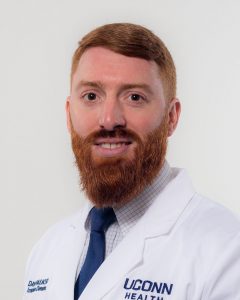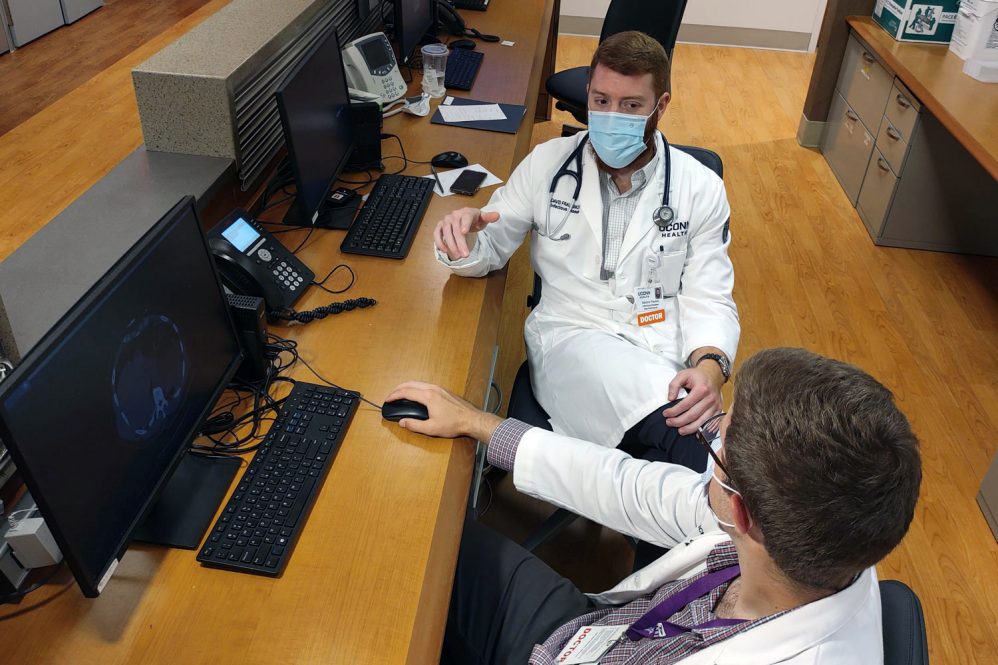It’s all around us, hiding in plain sight, and it can make some people very sick without knowing what it even is.
But unlike COVID-19, this infectious disease does not have a vaccine and is not highly contagious. And even though the bacteria themselves are ubiquitous, illness from them is relatively uncommon.
Still, non tuberculous mycobacteria infections have been on the rise in recent years as advances in diagnostic testing have improved doctors’ ability to detect them. And once they take hold, they can be severe.

“These infections are pretty complicated,” says Dr. David Fraulino, one of the most recent additions to the UConn Health faculty. “They cause a spectrum of pulmonary as well as skin and soft-tissue infections, and are pathogens that are notoriously multi-drug resistant, making diagnosis and treatment quite challenging.”
Fraulino is an infectious diseases physician with specialized training in non tuberculous mycobacterial, or NTM, infections.
“NTM are environmental organisms,” Fraulino says. “They are in soil, dust, and water. They’re all around us. They are often unpredictable in whom they infect or why they infect, but we have some reasons for why certain hosts are more at risk. They are more than capable of causing a devastating disease process in the right host, and it’s very, very difficult to get rid of them. So it can give clinicians a lot of worry and frustration on how to approach it.”
A graduate of UConn’s internal medicine residency program, Fraulino completed an infectious diseases fellowship at the University of Colorado, including elite training in NTM infections at the world-renowned affiliated respiratory hospital National Jewish Health.
I just had such a positive time here as a resident. I felt very supported. — Dr. David Fraulino
“When I was out in Colorado, we would have people flying from all over the world to come get treated, including many people coming from Connecticut and New England,” Fraulino says. “I would say that was the catalyst of my early thoughts of returning to Connecticut with this training. I knew I wanted to come back here eventually, so maybe I can serve as a more local resource, save patients a flight, and provide the same access to quality care.”
Fraulino grew up in Portland, Connecticut, and went to Salve Regina University in Newport, Rhode Island, for his undergraduate study. He spent time doing immunology research at Harvard Medical School in Boston before attending medical school at the University of New England College of Medicine in Biddeford, Maine.
Before heading out to Denver in the summer of 2020, Fraulino spent the final months of his UConn residency in the throes of the early COVID-19 outbreak, in full personal protective equipment daily caring for patients in the John Dempsey Hospital Intensive Care Unit.
He was convinced when he did return to Connecticut, it would be to join the faculty at UConn Health, which he did July this year.
“I told my family UConn was where I ultimately wanted to be,” Fraulino says. “I just had such a positive time here as a resident. I felt very supported. Residency is an extremely challenging time in any trainee’s life, but if you’re in an environment that gives you the necessary support to succeed, it really does create an idea and a comfort that makes you want to come back to it.”
Dr. Lisa Chirch, one of UConn Health’s infectious diseases physicians, worked closely with Fraulino, and he considers her one of his biggest mentors.
“We are thrilled that he has chosen to come ‘home’ to UConn,” Chirch say. “We never wanted him to leave in the first place! His infectious positivity and wit were beloved by many during his residency years, and word of his return spread quickly. We are all so happy to welcome him back.”
Adds Dr. Kevin Dieckhaus, division chief, who recruited Fraulino back to UConn Health, “We are excited that Dr. Fraulino has returned to the University of Connecticut, and are happy to bring in his expertise for management of these difficult-to-treat infections. Dr. Fraulino is available to evaluate any patient who may have a positive microbiologic culture for NTMs to provide guidance on antibiotic therapy.”
Things to watch for that could indicate an NTM infection include pulmonary symptoms such as dry cough, hemoptysis, fatigue, weight loss, or night sweats that have not responded to traditional therapies despite multiple attempts at treatment.
“Classic features of a slowly evolving pulmonary process in a susceptible host with underlying lung disease would be a sign for providers to consider NTM as a potential cause, especially in the setting of someone with conditions such as bronchiectasis or cystic fibrosis,” Fraulino says.
He encourages community physicians to refer suspected cases to UConn Health’s infectious diseases practice.
“One of the most critical things with NTM infections is not to expose them to too many antibiotics ahead of time, because of how rapidly they become resistant, and to obtain samples for specialized testing,” Fraulino says.
Learn more about the UConn Health Infectious Diseases Division, or call 860-679-2411 for a consultation.



